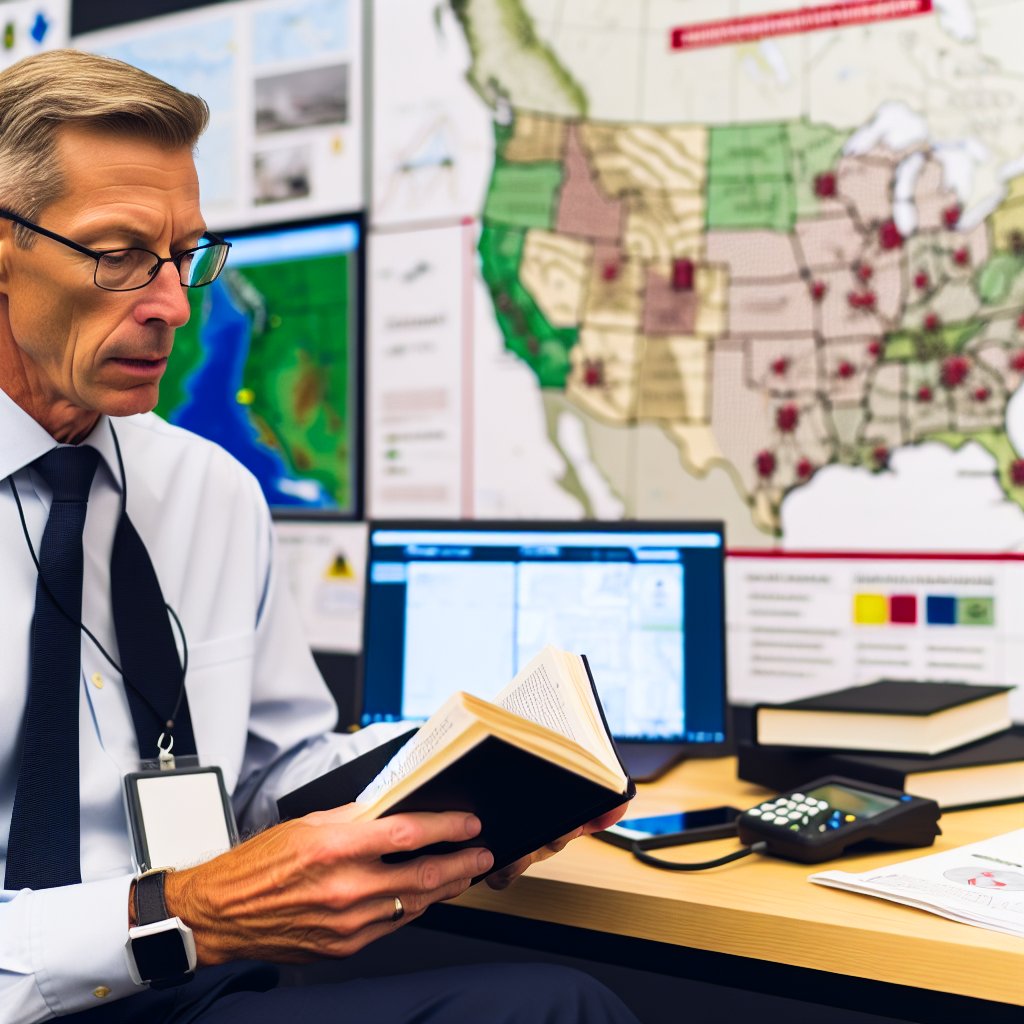Introduction
Emergency Management Directors are responsible for coordinating disaster response and preparedness efforts.
As leaders in high-stress situations, it is crucial for them to have strong leadership skills.
Brief Overview of Emergency Management Director Role
Emergency Management Directors are in charge of creating and implementing emergency plans.
They train staff and coordinate emergency response activities during crises.
Crises may include natural disasters or terrorist attacks.
Importance of Developing Leadership Skills in this Role
Developing leadership skills is essential for Emergency Management Directors.
It enables them to effectively manage teams in complex and challenging situations.
Strong leadership ensures clear communication, quick decision-making, and efficient coordination of resources.
Understanding the Role of an Emergency Management Director
An emergency management director is responsible for planning, coordinating, and directing emergency response programs and procedures.
Responsibilities and Duties
- Developing emergency response plans to address various types of emergencies.
- Coordinating with other agencies and organizations to ensure a comprehensive response.
- Training staff and conducting drills to prepare for potential emergencies.
- Communicating with the public to provide information and guidance during crises.
- Evaluating the effectiveness of response efforts and making adjustments as needed.
Key Skills Required
- Strong communication skills to effectively convey information to diverse audiences.
- Strategic thinking to anticipate potential challenges and develop effective solutions.
- Decision-making abilities to make quick and informed choices during emergencies.
- Organizational skills to ensure resources are allocated efficiently and effectively.
- Leadership qualities to inspire and motivate teams during high-stress situations.
Importance of Strong Leadership in Times of Crisis
Effective leadership is essential during emergencies to provide direction, support, and coordination to response efforts.
A strong leader can inspire confidence, maintain calm, and make critical decisions under pressure.
Leadership skills are crucial in managing teams, resources, and communication during crises.
Successful emergency management directors rely on their leadership abilities to guide their organizations through challenging situations.
Developing Effective Communication Skills
Effective communication is crucial for an Emergency Management Director to lead effectively during emergencies.
Importance of Clear and Concise Communication
Clear and concise communication ensures that information is accurately conveyed to team members, stakeholders, and the public.
Strategies for Effective Communication with Team Members, Stakeholders, and the Public
- Regular meetings: Schedule regular meetings to keep team members informed and engaged.
- Use multiple channels: Utilize various communication channels such as email, phone calls, and in-person meetings.
- Be transparent: Share relevant information openly to build trust with stakeholders and the public.
Role of Communication in Leading During Emergencies
During emergencies, effective communication is vital for coordinating response efforts, disseminating crucial information, and ensuring the safety of the community.
Developing strong communication skills is essential for an Emergency Management Director to successfully lead their team, engage with stakeholders, and communicate effectively with the public during emergencies.
By prioritizing clear and concise communication, utilizing various strategies to reach different audiences, and recognizing the critical role of communication in emergency leadership, directors can ensure a coordinated and efficient response to any crisis.
See Related Content: Parole Officer: Fieldwork vs. Office Work
Building a Strong Team
Effective emergency management requires a strong team that is able to work together seamlessly to handle any crisis that may arise.
Transform Your Career Today
Unlock a personalized career strategy that drives real results. Get tailored advice and a roadmap designed just for you.
Start NowThe importance of teamwork cannot be overstated in this field, as the decisions made by the team can have life or death consequences.
Importance of Teamwork in Emergency Management
During a crisis, time is of the essence and having a team that can efficiently communicate and coordinate their efforts is crucial.
Each team member brings a unique set of skills and experiences to the table, and by working together, they can effectively address the challenges they may face.
Collaboration also allows for a diversity of perspectives which can lead to more innovative solutions.
Strategies for Fostering Collaboration and Trust Among Team Members
Building trust among team members is essential for effective collaboration.
This can be achieved through open and honest communication, actively listening to each other’s ideas, and valuing everyone’s contributions.
Encouraging a sense of camaraderie through team-building activities can also help strengthen relationships and improve teamwork.
Developing a Culture of Accountability and Support Within the Team
To ensure accountability within the team, it is important to establish clear roles and responsibilities for each member.
Regular check-ins and progress reports can help keep everyone on track and accountable for their tasks.
Additionally, providing support and feedback to team members can help them navigate challenges and grow professionally.
Building a strong team in emergency management is essential for effectively responding to crises.
By fostering collaboration, trust, accountability, and support within the team, organizations can ensure that they are prepared to handle any emergency situation that comes their way.
Gain More Insights: Women in State Trooper Roles: Breaking Barriers
Decision-making under pressure
During emergencies, quick decisions are crucial for effective response and mitigation efforts.
Importance of making quick and informed decisions during emergencies
- Time-sensitive situations require immediate actions to prevent further escalation.
- Decisive leadership can save lives and minimize damages during crises.
Strategies for developing critical thinking skills
- Regular training and simulations can help individuals think on their feet.
- Encourage team members to brainstorm and analyze various scenarios.
- Foster a culture of open communication and information sharing.
- Seek feedback and learn from past decisions to improve future outcomes.
Role of risk assessment and crisis management in decision-making
- Conducting risk assessments can identify potential hazards and vulnerabilities.
- Crisis management frameworks provide guidelines for effective decision-making.
- Prioritize risks based on severity and likelihood of occurrence.
- Develop contingency plans to address unexpected challenges and events.
Developing leadership skills in decision-making under pressure is critical for emergency management directors.
By honing critical thinking skills, utilizing risk assessment tools, and following crisis management protocols, leaders can navigate complex situations with clarity and efficiency.
See Related Content: Top Tools Used by Bomb Squad Technicians

Conflict Resolution and Crisis Management
When it comes to being an Emergency Management Director, conflict resolution and crisis management skills are essential.
Here are some key aspects to consider:
- Dealing with conflicts and challenges within the team: As a leader, it is crucial to address any conflicts or challenges that arise within the team promptly and effectively.
- Strategies for resolving conflicts peacefully and effectively: Utilize active listening, open communication, and mediation techniques to resolve conflicts peacefully and foster a collaborative team environment.
- Handling crisis situations with resilience and calmness: During high-stress situations, maintaining a sense of calm and composure is paramount. This helps keep the team focused and ensures efficient crisis management.
Conflict resolution involves identifying and addressing the root cause of the conflict, rather than just treating the symptoms.
Transform Your Career Today
Unlock a personalized career strategy that drives real results. Get tailored advice and a roadmap designed just for you.
Start NowBy actively listening to all parties involved and facilitating open dialogue, you can reach a resolution that satisfies everyone.
When faced with crisis situations, it is crucial for an Emergency Management Director to demonstrate resilience and maintain a composed demeanor.
This not only sets a positive example for the team but also helps in making effective decisions under pressure.
Effective crisis management requires a structured approach that includes clear communication channels, designated roles and responsibilities, and regular training and drills.
By preparing in advance and having contingency plans in place, you can navigate crisis situations with confidence and competence.
Explore Further: Campus Security Officer: Role in Cybersecurity Awareness
Continuous learning and improvement
As an emergency management director, it is crucial to recognize the importance of continuous learning and improvement.
Ongoing training and education play a significant role in honing leadership skills and staying updated on the latest best practices and technologies.
Here are some strategies to help you in this process:
Importance of ongoing training and education
Continuous learning is essential for emergency management directors to enhance their leadership skills and adapt to the ever-changing landscape of emergency response.
By engaging in ongoing training and education, you can stay ahead of the curve and be better prepared to handle emergencies effectively.
Whether it’s attending workshops, seminars, or pursuing advanced certifications, investing in your professional development will ultimately benefit your team and the community you serve.
Strategies for staying updated on best practices and latest technologies
One way to stay updated on best practices and latest technologies is by networking with other emergency management professionals.
By attending conferences, joining professional organizations, and participating in online forums, you can gain valuable insights and exchange ideas with peers in the field.
Reading industry publications, following blogs, and subscribing to newsletters are also effective ways to stay informed about emerging trends and advancements in emergency management.
Commitment to personal and professional development for effective leadership
Effective leadership requires a commitment to personal and professional development.
It is essential to set aside time for self-reflection, goal setting, and skill-building to continue growing as a leader.
By seeking feedback from mentors, colleagues, and team members, you can identify areas for improvement and take proactive steps to enhance your leadership capabilities.
Embracing a growth mindset and being open to new challenges will enable you to lead with confidence and resilience in the face of adversity.
Developing Leadership Skills for Emergency Management Success
Recap of key points discussed in the blog post: Developing leadership skills is crucial for an emergency management director’s success.
Transform Your Career Today
Unlock a personalized career strategy that drives real results. Get tailored advice and a roadmap designed just for you.
Start NowEffective communication, decision-making, and teamwork are essential.
Importance of developing leadership skills as an emergency management director: Leadership skills are essential for handling crises, coordinating response efforts, and ensuring the safety and well-being of the community.
Encouragement for readers to invest in their leadership development for success in the role: Investing in leadership development through training, mentorship, and continuous learning can enhance one’s ability to lead during emergencies and make a positive impact on community resilience.
Additional Resources
Office of Safety, Security and Protection | Home
Online Fire & Emergency Services Administration Degree | CSU …




